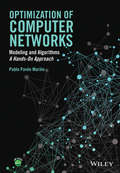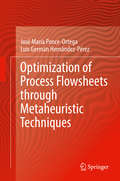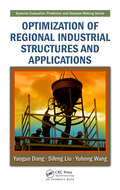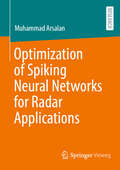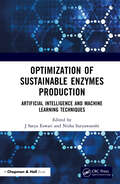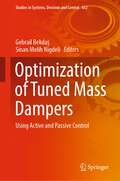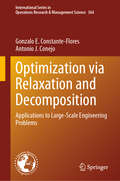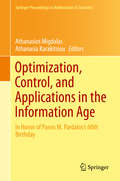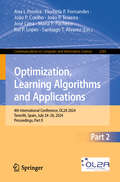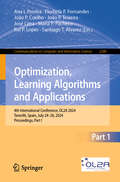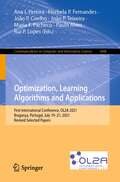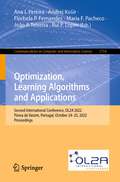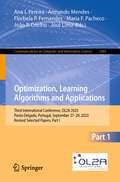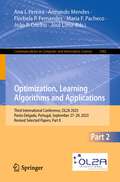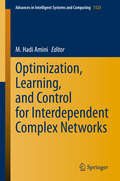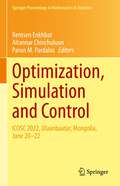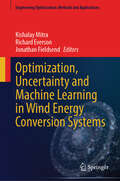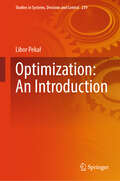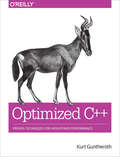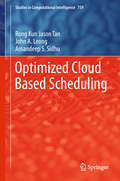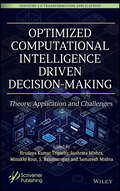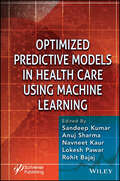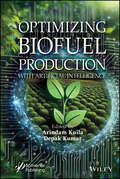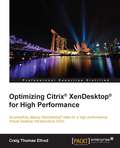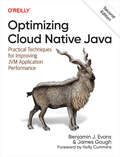- Table View
- List View
Optimization of Computer Networks: A Hands-On Approach
by Pablo Pavón MariñoThis book covers the design and optimization of computer networks applying a rigorous optimization methodology, applicable to any network technology. It is organized into two parts. In Part 1 the reader will learn how to model network problems appearing in computer networks as optimization programs, and use optimization theory to give insights on them. Four problem types are addressed systematically - traffic routing, capacity dimensioning, congestion control and topology design. Part 2 targets the design of algorithms that solve network problems like the ones modeled in Part 1. Two main approaches are addressed - gradient-like algorithms inspiring distributed network protocols that dynamically adapt to the network, or cross-layer schemes that coordinate the cooperation among protocols; and those focusing on the design of heuristic algorithms for long term static network design and planning problems. Following a hands-on approach, the reader will have access to a large set of examples in real-life technologies like IP, wireless and optical networks. Implementations of models and algorithms will be available in the open-source Net2Plan tool from which the user will be able to see how the lessons learned take real form in algorithms, and reuse or execute them to obtain numerical solutions. An accompanying link to the author's own Net2plan software enables readers to produce numerical solutions to a multitude of real-life problems in computer networks (www.net2plan.com).
Optimization of Process Flowsheets through Metaheuristic Techniques
by José María Ponce-Ortega Luis Germán Hernández-PérezThis textbook presents a general multi-objective optimization framework for optimizing chemical processes by implementing a link between process simulators and metaheuristic techniques. The proposed approach is general and shows how to implement links between different process simulators such as Aspen Plus®, HYSIS®, Super Pro Designer® linked to a variety of metaheuristic techniques implemented in Matlab®, Excel®, C++, and others, eliminating the numerical complications through the optimization process. Furthermore, the proposed framework allows the use of thermodynamic, design and constitutive equations implemented in the process simulator to implement any process. Aimed at graduate and undergraduate students, it presents introductory chapters for process simulators and metaheuristic optimization techniques and provides several worked exercises as well as proposed exercises. In addition, accompanying tutorial videos clearly explaining the implemented methodologies are available online. Also, some Matlab® routines are included as electronic supporting material.
Optimization of Regional Industrial Structures and Applications (Systems Evaluation, Prediction, and Decision-Making)
by Sifeng Liu Yaoguo Dang Yuhong WangBased on research projects supported by the National Natural Science Foundation of China and Nanjing University of Aeronautics and Astronautics, Optimization of Regional Industrial Structures and Applications provides an authoritative introduction to and survey of the cutting-edge research and applications in industrial structure optimization. Empl
Optimization of Spiking Neural Networks for Radar Applications
by Muhammad ArsalanThis book offers a comprehensive exploration of the transformative role that edge devices play in advancing Internet of Things (IoT) applications. By providing real-time processing, reduced latency, increased efficiency, improved security, and scalability, edge devices are at the forefront of enabling IoT growth and success. As the adoption of AI on the edge continues to surge, the demand for real-time data processing is escalating, driving innovation in AI and fostering the development of cutting-edge applications and use cases. Delving into the intricacies of traditional deep neural network (deepNet) approaches, the book addresses concerns about their energy efficiency during inference, particularly for edge devices. The energy consumption of deepNets, largely attributed to Multiply-accumulate (MAC) operations between layers, is scrutinized. Researchers are actively working on reducing energy consumption through strategies such as tiny networks, pruning approaches, and weight quantization. Additionally, the book sheds light on the challenges posed by the physical size of AI accelerators for edge devices. The central focus of the book is an in-depth examination of SNNs' capabilities in radar data processing, featuring the development of optimized algorithms.
Optimization of Sustainable Enzymes Production: Artificial Intelligence and Machine Learning Techniques
by J. Satya Eswari Nisha SuryawanshiThis book is designed as a reference book and presents a systematic approach to analyze evolutionary and nature-inspired population-based search algorithms. Beginning with an introduction to optimization methods and algorithms and various enzymes, the book then moves on to provide a unified framework of process optimization for enzymes with various algorithms. The book presents current research on various applications of machine learning and discusses optimization techniques to solve real-life problems. •The book compiles the different machine learning models for optimization of process parameters for production of industrially important enzymes. The production and optimization of various enzymes produced by different microorganisms are elaborated in the book. •It discusses the optimization methods that help minimize the error in developing patterns and classifications, which further helps improve prediction and decision-making. •Covers the best-performing methods and approaches for optimization sustainable enzymes production with AI integration in a real-time environment. •Featuring valuable insights, the book helps readers explore new avenues leading towards multidisciplinary research discussions. The book is aimed primarily at advanced undergraduates and graduates studying machine learning, data science and industrial biotechnology. Researchers and professionals will also find this book useful.
Optimization of Tuned Mass Dampers: Using Active and Passive Control (Studies in Systems, Decision and Control #432)
by Gebrail Bekdaş Sinan Melih NigdeliThis book is a timely book to summarize the latest developments in the optimization of tuned mass dampers covering all classical approaches and new trends including metaheuristic algorithms. Also, artificial intelligence and machine learning methods are included to predict optimum results by skipping long optimization processes. Another difference and advantage of the book are to provide chapters about several types of control types including passive tuned mass dampers, active tuned mass dampers, tuned liquid dampers, tuned liquid column dampers and inerter dampers. Tuned mass dampers (TMDs) are vibration absorber devices used in all types of mechanic systems. The key factor in the design is an effective tuning of TMDs for the desired performance. In practice, several high-rise structures and bridges were designed by including TMDs. Also, TMDs were installed after the construction of the structures after several negative experiences resulting from the disturbing sway of the structures. In optimum design, several closed-form expressions have been proposed for optimum frequency and damping ratio of TMDs, but the exact optimization requires iterative optimization approaches. The current trend is to use evolutionary algorithms and metaheuristic optimization methods to reach the goal.
Optimization via Relaxation and Decomposition: Applications to Large-Scale Engineering Problems (International Series in Operations Research & Management Science #364)
by Antonio J. Conejo Gonzalo E. Constante-FloresThis book offers an up-to-date description of relaxation/approximation and decomposition techniques, demonstrating how their combined use efficiently solves large-scale optimization problems relevant to engineering, particularly in electrical, and industrial engineering, with a focus on energy. Specifically, it presents linear and nonlinear relaxations and approximations that are relevant to optimization problems, introduces complicating constraints and complicating variables decomposition techniques that can take advantage of relaxations and approximations, and examines their applications in the engineering field. Written in an accessible engineering language and filled with numerous illustrative examples and end-of-chapter exercises for all chapters, this book is a valuable resource for advanced undergraduate and graduate students, researchers, and practitioners in power engineering and industrial engineering. Moreover, business students with a keen interest in decision-making problems will also benefit greatly from its practical insights.
Optimization, Control, and Applications in the Information Age
by Athanasia Karakitsiou Athanasios MigdalasRecent developments in theory, algorithms, and applications in optimization and control are discussed in this proceedings, based on selected talks from the 'Optimization Control and Applications in the Information Age' conference, organized in honor of Panos Pardalos's 60th birthday. This volume contains numerous applications to optimal decision making in energy production and fuel management, data mining, logistics, supply chain management, market network analysis, risk analysis, and community network analysis. In addition, a short biography is included describing Dr. Pardalos's path from a shepherd village on the high mountains of Thessaly to academic success. Due to the wide range of topics such as global optimization, combinatorial optimization, game theory, stochastics and programming contained in this publication, scientists, researchers, and students in optimization, operations research, analytics, mathematics and computer science will be interested in this volume.
Optimization, Learning Algorithms and Applications: 4th International Conference, OL2A 2024, Tenerife, Spain, July 24-26, 2024, Proceedings, Part II (Communications in Computer and Information Science #2281)
by Ana I. Pereira Florbela P. Fernandes João P. Coelho João P. Teixeira Maria F. Pacheco Rui P. Lopes José Lima Santiago T. ÁlvarezThis two-volume set, CCIS 2280 and CCIS 2281, constitutes the proceedings of the 4th International Conference on Optimization, Learning Algorithms and Applications, OL2A 2024, held in Tenerife, Spain, in July 2024. The 41 papers presented here were carefully reviewed and selected from 105 submissions. They have been organized in the two volumes under the following topical sections:- Part I: Learning Algorithms in Engineering Education; Machine Learning; Deep Learning; Optimization in the SDG context. Part II: Optimization in Control Systems Design; Optimization.
Optimization, Learning Algorithms and Applications: 4th International Conference, OL2A 2024, Tenerife, Spain, July 24–26, 2024, Proceedings, Part I (Communications in Computer and Information Science #2280)
by Ana I. Pereira Florbela P. Fernandes João P. Coelho João P. Teixeira Maria F. Pacheco Rui P. Lopes José Lima Santiago T. ÁlvarezThis two-volume set, CCIS 2280 and CCIS 2281, constitutes the proceedings of the 4th International Conference on Optimization, Learning Algorithms and Applications, OL2A 2024, held in Tenerife, Spain, in July 2024. The 41 papers presented here were carefully reviewed and selected from 105 submissions. They have been organized in the two volumes under the following topical sections:- Part I: Learning Algorithms in Engineering Education; Machine Learning; Deep Learning; Optimization in the SDG context. Part II: Optimization in Control Systems Design; Optimization.
Optimization, Learning Algorithms and Applications: First International Conference, OL2A 2021, Bragança, Portugal, July 19–21, 2021, Revised Selected Papers (Communications in Computer and Information Science #1488)
by Ana I. Pereira Florbela P. Fernandes João P. Coelho João P. Teixeira Maria F. Pacheco Paulo Alves Rui P. LopesThis book constitutes selected and revised papers presented at the First International Conference on Optimization, Learning Algorithms and Applications, OL2A 2021, held in Bragança, Portugal, in July 2021. Due to the COVID-19 pandemic the conference was held online. The 39 full papers and 13 short papers were thoroughly reviewed and selected from 134 submissions. They are organized in the topical sections on optimization theory; robotics; measurements with the internet of things; optimization in control systems design; deep learning; data visualization and virtual reality; health informatics; data analysis; trends in engineering education.
Optimization, Learning Algorithms and Applications: Second International Conference, OL2A 2022, Póvoa de Varzim, Portugal, October 24-25, 2022, Proceedings (Communications in Computer and Information Science #1754)
by Andrej Košir Ana I. Pereira Florbela P. Fernandes João P. Teixeira Maria F. Pacheco Rui P. LopesThis book constitutes the proceedings of the Second International Conference on Optimization, Learning Algorithms and Applications, OL2A 2022, held in Bragança, Portugal, in October 2022. The 53 full papers and 3 short papers were thoroughly reviewed and selected from 145 submissions. They are organized in the topical sections on Machine and Deep Learning; Optimization; Artificial Intelligence; Optimization in Control Systems Design; Measurements with the Internet of Things; Trends in Engineering Education; Advances and Optimization in Cyber-Physical Systems; and Computer vision based on learning algorithms.
Optimization, Learning Algorithms and Applications: Third International Conference, OL2A 2023, Ponta Delgada, Portugal, September 27–29, 2023, Revised Selected Papers, Part I (Communications in Computer and Information Science #1981)
by Armando Mendes Ana I. Pereira Florbela P. Fernandes João P. Coelho Maria F. Pacheco José LimaThis two-volume set CCIS 1981 and 1982 constitutes the refereed post-conference proceedings of the Third International Conference on Optimization, Learning Algorithms and Applications, OL2A 2023, held in Ponta Delgada, Portugal, in September 2023.The 66 revised full papers presented in these proceedings were carefully reviewed and selected from 162 submissions. The papers are organized in the following topical sections:Volume I:Machine learning; learning algorithms in engineering education; machine learning and data analysis in internet of things; optimization; optimization in the SDG context.Volume II:Computer vision based on learning algorithms; machine learning and AI in robotics; optimization in control systems design.
Optimization, Learning Algorithms and Applications: Third International Conference, OL2A 2023, Ponta Delgada, Portugal, September 27–29, 2023, Revised Selected Papers, Part II (Communications in Computer and Information Science #1982)
by Armando Mendes Ana I. Pereira Florbela P. Fernandes João P. Coelho Maria F. Pacheco José LimaThis two-volume set CCIS 1981 and 1982 constitutes the refereed post-conference proceedings of the Third International Conference on Optimization, Learning Algorithms and Applications, OL2A 2023, held in Ponta Delgada, Portugal, in September 2023.The 66 revised full papers presented in these proceedings were carefully reviewed and selected from 162 submissions. The papers are organized in the following topical sections:Volume I:Machine learning; learning algorithms in engineering education; machine learning and data analysis in internet of things; optimization; optimization in the SDG context.Volume II:Computer vision based on learning algorithms; machine learning and AI in robotics; optimization in control systems design.
Optimization, Learning, and Control for Interdependent Complex Networks (Advances in Intelligent Systems and Computing #1123)
by M. Hadi AminiThis book focuses on a wide range of optimization, learning, and control algorithms for interdependent complex networks and their role in smart cities operation, smart energy systems, and intelligent transportation networks. It paves the way for researchers working on optimization, learning, and control spread over the fields of computer science, operation research, electrical engineering, civil engineering, and system engineering. This book also covers optimization algorithms for large-scale problems from theoretical foundations to real-world applications, learning-based methods to enable intelligence in smart cities, and control techniques to deal with the optimal and robust operation of complex systems. It further introduces novel algorithms for data analytics in large-scale interdependent complex networks. • Specifies the importance of efficient theoretical optimization and learning methods in dealing with emerging problems in the context of interdependent networks • Provides a comprehensive investigation of advance data analytics and machine learning algorithms for large-scale complex networks • Presents basics and mathematical foundations needed to enable efficient decision making and intelligence in interdependent complex networks M. Hadi Amini is an Assistant Professor at the School of Computing and Information Sciences at Florida International University (FIU). He is also the founding director of Sustainability, Optimization, and Learning for InterDependent networks laboratory (solid lab). He received his Ph.D. and M.Sc. from Carnegie Mellon University in 2019 and 2015 respectively. He also holds a doctoral degree in Computer Science and Technology. Prior to that, he received M.Sc. from Tarbiat Modares University in 2013, and the B.Sc. from Sharif University of Technology in 2011.
Optimization, Simulation and Control: ICOSC 2022, Ulaanbaatar, Mongolia, June 20–22 (Springer Proceedings in Mathematics & Statistics #434)
by Panos M. Pardalos Altannar Chinchuluun Rentsen EnkhbatThis volume gathers selected, peer-reviewed works presented at the 7th International Conference on Optimization, Simulation and Control, ICOSC 2022, held at the National University of Mongolia, Ulaanbaatar, June 20–22, 2022. Topics covered include (but are not limited to) mathematical programming; network, global, linear, nonlinear, parametric, stochastic, and multi-objective optimization; control theory; biomathematics; and deep and machine learning, to name a few. Held every three years since 2002, the ICOSC conference has become a traditional gathering for experienced and young researchers in optimization and control to share recent findings in these fields and discuss novel applications in myriad sectors. Researchers and graduate students in the fields of mathematics, engineering, and computer science can greatly benefit from this book, which can also be enjoyed by advanced practitioners in research laboratories and the industry. The 2022 edition of the ICOSC conference was sponsored by the Mongolian Academy of Sciences, the National University of Mongolia and the German-Mongolian Institute for Resources and Technology.
Optimization, Uncertainty and Machine Learning in Wind Energy Conversion Systems (Engineering Optimization: Methods and Applications)
by Richard Everson Kishalay Mitra Jonathan FieldsendThis book presents state-of-the-art technologies in wind farm layout optimization and control to improve the current industry/research practice. The contents take readers towards a different kind of uncertainty handling through the discussion on several techniques enabling maximum energy harnessing out of uncertain situations. The book aims to give a detailed overview of such concepts in the first part, where the recent advancements in the fields of (i) Wind farm layout optimization, (ii) Multi-objective Optimization and Uncertainty handling in optimization methods, (iii) Development of Machine Learning-based surrogate models in optimization, and (iv) Different types of wake models for wind farms will be discussed. The second part will cover the application of the aforementioned techniques on the wind farm layout optimization and control through several chapters such as (i) Wind farm performance assessment using Computational Fluid Dynamics (CFD) tools, (ii) Artificial Neural Network (ANN) based hybrid wake models, (iii) Long Short-term Memory (LSTM) & Support Vector Regression (SVR) based forecasting and micro-siting, (iv) windfarm micro-siting using data-driven Robust Optimization (RO) as well as Generative Adversarial Networks (GANs), (v) Reinforcement learning (RL) based wind farm control and (vi) Application of eXplainable AI (XAI) tools for interpreting wind time-series data. In this manner, the book provides state-of-the-art techniques in the fields of multi-objective optimization, Evolutionary Algorithms, Machine Learning surrogate models, Bayesian Optimization, Data Analysis, and Optimization under Uncertainty and their applications in the field of wind energy generation that can be extremely generic and can be applied to many other engineering fields. This volume will be of interest to those in academia and industry.
Optimization: An Introduction (Studies in Systems, Decision and Control #239)
by Libor PekařThis book covers analytic methods to solve one-dimensional and multi-dimensional problems with or without possible constraints, iterative numerical techniques based on the gradient calculation or its estimation, and numerical methods that do not require the knowledge of gradient and use only comparative iterative tests. This book provides the reader with a basic introduction to some traditional parameter optimization techniques. The presented problems and their solution methods represent a core of the parameter optimization reign since the 17th century to the 1970s. Linear and integer programming via the simplex table is also introduced. Two simple selected problems that are solved using dynamic programming principles are also given to the reader. A general approach to constraints via penalty and barrier functions is introduced. A concise introduction to the decision and game theory concludes the book. The book does not intend to provide the reader with a rigorous mathematic derivation of the presented methods. Its aim is instead to bring to the attention essential optimization tools for practitioners and undergraduate students and introduce selected well-established techniques to them when optimizing parameters of various models. Each method is described theoretically and supported by one or more numerical examples that vary from academic ones, through business economics to funny real-world problems that attract a broad audience. A sketch of Matlab code also follows numerical-based techniques. The author believes that the book finds its place in the libraries of many undergraduate students of various technical study programs and modern, thoughtful people worldwide, regardless of their expertise.
Optimized C++: Proven Techniques for Heightened Performance
by Kurt GuntherothIn today’s fast and competitive world, a program’s performance is just as important to customers as the features it provides. This practical guide teaches developers performance-tuning principles that enable optimization in C++. You’ll learn how to make code that already embodies best practices of C++ design run faster and consume fewer resources on any computer—whether it’s a watch, phone, workstation, supercomputer, or globe-spanning network of servers.Author Kurt Guntheroth provides several running examples that demonstrate how to apply these principles incrementally to improve existing code so it meets customer requirements for responsiveness and throughput. The advice in this book will prove itself the first time you hear a colleague exclaim, “Wow, that was fast. Who fixed something?”Locate performance hot spots using the profiler and software timersLearn to perform repeatable experiments to measure performance of code changesOptimize use of dynamically allocated variablesImprove performance of hot loops and functionsSpeed up string handling functionsRecognize efficient algorithms and optimization patternsLearn the strengths—and weaknesses—of C++ container classesView searching and sorting through an optimizer’s eyeMake efficient use of C++ streaming I/O functionsUse C++ thread-based concurrency features effectively
Optimized Cloud Based Scheduling (Studies In Computational Intelligence #759)
by Amandeep S. Sidhu John A. Leong Rong Kun TanThis book presents an improved design for service provisioning and allocation models that are validated through running genome sequence assembly tasks in a hybrid cloud environment. It proposes approaches for addressing scheduling and performance issues in big data analytics and showcases new algorithms for hybrid cloud scheduling. Scientific sectors such as bioinformatics, astronomy, high-energy physics, and Earth science are generating a tremendous flow of data, commonly known as big data. In the context of growing demand for big data analytics, cloud computing offers an ideal platform for processing big data tasks due to its flexible scalability and adaptability. However, there are numerous problems associated with the current service provisioning and allocation models, such as inefficient scheduling algorithms, overloaded memory overheads, excessive node delays and improper error handling of tasks, all of which need to be addressed to enhance the performance of big data analytics.
Optimized Computational Intelligence Driven Decision-Making: Theory, Application and Challenges (Industry 5.0 Transformation Applications)
by Minakhi Rout S. Balamurugan Hrudaya Kumar Tripathy Sushruta Mishra Samaresh MishraThis book covers a wide range of advanced techniques and approaches for designing and implementing computationally intelligent methods in different application domains which is of great use to not only researchers but also academicians and industry experts. Optimized Computational Intelligence (OCI) is a new, cutting-edge, and multidisciplinary research area that tackles the fundamental problems shared by modern informatics, biologically-inspired computation, software engineering, AI, cybernetics, cognitive science, medical science, systems science, philosophy, linguistics, economics, management science, and life sciences. OCI aims to apply modern computationally intelligent methods to generate optimum outcomes in various application domains. This book presents the latest technologies-driven material to explore optimized various computational intelligence domains. includes real-life case studies highlighting different advanced technologies in computational intelligence; provides a unique compendium of current and emerging hybrid intelligence paradigms for advanced informatics; reflects the diversity, complexity, and depth and breadth of this critical bio-inspired domain; offers a guided tour of computational intelligence algorithms, architecture design, and applications of learning in dealing with cognitive informatics challenges; presents a variety of intelligent and optimized techniques designed to represent, enhance, and empower multi-disciplinary and multi-institutional data analytics research in intelligent decision-making system dynamics; includes architectural models and applications-based augmented solutions for optimized computational intelligence. Audience The book will interest a range of engineers and researchers in information technology, computer science, and artificial intelligence working in the interdisciplinary field of computational intelligence.
Optimized Predictive Models in Health Care Using Machine Learning
by Sandeep Kumar Navneet Kaur Anuj Sharma Lokesh Pawar Rohit BajajOPTIMIZED PREDICTIVE MODELS IN HEALTH CARE USING MACHINE LEARNING This book is a comprehensive guide to developing and implementing optimized predictive models in healthcare using machine learning and is a required resource for researchers, healthcare professionals, and students who wish to know more about real-time applications. The book focuses on how humans and computers interact to ever-increasing levels of complexity and simplicity and provides content on the theory of optimized predictive model design, evaluation, and user diversity. Predictive modeling, a field of machine learning, has emerged as a powerful tool in healthcare for identifying high-risk patients, predicting disease progression, and optimizing treatment plans. By leveraging data from various sources, predictive models can help healthcare providers make informed decisions, resulting in better patient outcomes and reduced costs. Other essential features of the book include: provides detailed guidance on data collection and preprocessing, emphasizing the importance of collecting accurate and reliable data; explains how to transform raw data into meaningful features that can be used to improve the accuracy of predictive models; gives a detailed overview of machine learning algorithms for predictive modeling in healthcare, discussing the pros and cons of different algorithms and how to choose the best one for a specific application; emphasizes validating and evaluating predictive models; provides a comprehensive overview of validation and evaluation techniques and how to evaluate the performance of predictive models using a range of metrics; discusses the challenges and limitations of predictive modeling in healthcare; highlights the ethical and legal considerations that must be considered when developing predictive models and the potential biases that can arise in those models. Audience The book will be read by a wide range of professionals who are involved in healthcare, data science, and machine learning.
Optimizing Biofuel Production with Artificial Intelligence
by Arindam Kuila Depak KumarOptimizing Biofuel Production with Artificial Intelligence will help readers discover how integrating artificial intelligence with biotechnological advancements can revolutionize biofuel production, ensuring a sustainable energy future in response to pressing global challenges like pollution and climate change. This book presents artificial intelligence as a technique to aid the production of biofuels. Recently, tremendous developments have been made in energy and environmental biotechnologies, spurred by societal issues like pollution control, energy security, and climate change. Energy can be obtained from a variety of sources, including coal, oil, natural gas, solar, wind, and nuclear energy. The need to transition to new energy results from finite resources and economic sustainability. Biotechnological process optimization is crucial for ensuring a quality final product and boosting bioconversion performance efficiency. When combined with traditional simulation and modeling methods, artificial intelligence and computer technology can help define ideal process parameters and save total process costs. The energy sector can benefit from artificial intelligence in several ways, including increased asset efficiency, early detection and assessment of wildfire risks, assistance with vegetation management and storm recovery, and optimized energy use. The new frontier for energy is biomass.
Optimizing Citrix® XenDesktop® for High Performance
by Craig Thomas EllrodSuccessfully deploy XenDesktop sites for a high performance Virtual Desktop Infrastructure (VDI) About This Book * Size the VDI environment so the administrator has breathing room to design and build their XenDesktop systems efficiently * Use desktop virtualization tools to provide users fast, convenient access to their Windows Desktops * Understand the key pinch points in the resource layers such as; the Client layer, Network Layer, Access Layer, Control Layer, Services Layer and Resources Layer Who This Book Is For Citrix XenDesktop High Performance is written for administrators who would like to deploy Citrix XenDesktop in their enterprises with the aim of providing high efficiency. Basic familiarity with Citrix XenDesktop is assumed. What You Will Learn * Understand key concepts, terminology, and system requirements * Discover how components work in regards to virtualization and performance * Identify architectural resource layers and components * Explore the hypervisor virtualization software that runs on top of the hardware and learn how to tune it for maximum performance * Analyze client hardware and software, including thin clients and mobile devices In Detail Citrix XenDesktop is a suite of desktop virtualization tools designed to provide users with fast and convenient access to their Windows desktops and applications through any device. Virtual desktops mean that rather than setting up hundreds or thousands of individual computers in an enterprise, companies can instead opt to create servers with large amounts of memory, disk, and processing resources, and use virtualization to offer these resources to end users. The result of this is that users are provided with an experience that appears to be identical to having an individual desktop PC. Each user has some disk space, processor time, and memory allocated to them, as though it is present on their own physical machine, when in reality, the resources are physically present on a centralized server. This book starts by answering the basic questions you need to ask when considering XenDesktop, followed by methods of how you can properly size your server infrastructure for XenDesktop. You'll discover how to optimize the virtual machines used in XenDesktop, how to optimize your network for XenDesktop, and how to optimize the hypervisor and the cloud. You'll also learn how to monitor XenDesktop to maximize performance. By the end of the book, you will be able to plan, design, build, and deploy high performance XenDesktop Virtualization systems in enterprises. You will also know how to monitor and maintain your systems to ensure smooth operation. Style and approach This book is an all-inclusive guide that uncovers hidden and previously unpublished performance improvement areas for any XenDesktop site.
Optimizing Cloud Native Java: Practical Techniques for Improving JVM Application Performance
by James Gough Benjamin J. EvansPerformance tuning is an experimental science, but that doesn't mean engineers should resort to guesswork and folklore to get the job done. Yet that's often the case. With this practical book, intermediate to advanced Java technologists working with complex platforms will learn how to tune Java cloud applications for performance using a quantitative, verifiable, and repeatable approach.In response to the ubiquity of cloud computing, this updated edition of Optimizing Cloud Native Java addresses topics that are key to high performance of Java applications in the cloud. Many resources on performance tend to focus on the theory and internals of Java virtual machines, but this book discusses the low-level technical aspects within the context of performance-tuning practicalities and examines a wide range of aspects.With this book, you will:Learn how Java principles and technology make the best use of modern hardware, operating systems, and cloud stacksExamine the pitfalls of measuring Java performance numbers and the drawbacks of microbenchmarkingUnderstand how to package, deploy, operate, and debug Java/JVM applications in modern cloud environmentsApply emerging observability approaches to obtain deep understanding of cloud native applicationsUse Java language performance techniques including concurrent and distributed forms
